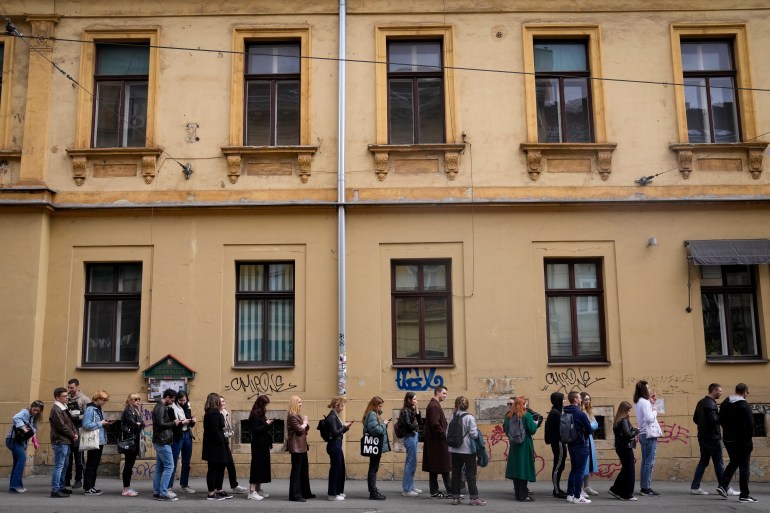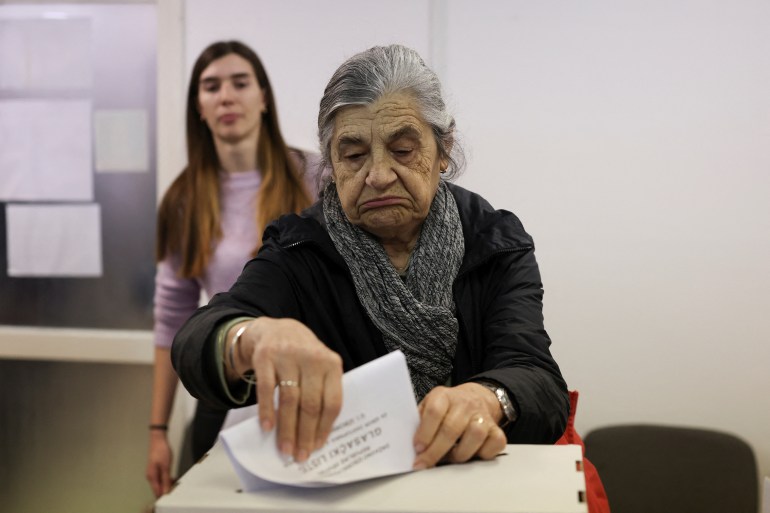The country is likely to face a period of uncertainty as HDZ negotiates with smaller parties to form a governing coalition.
The ruling HDZ party has won the most seats in Croatia’s election, according to almost complete official results, but faces tough talks to secure a majority in parliament and form a governing coalition.
Prime Minister Andrej Plenkovic’s Croatian Democratic Union (HDZ) had 60 seats in the 151-member assembly, according to results from more than 90 percent of the polling stations. In the previous 2020 vote, the party won 66 seats.
A centre-left coalition, led by the Social Democrats (SDP), won 42.
The right-wing Homeland Movement was set to come third with 14 seats.
“The HDZ has, for the third [consecutive] time, convincingly won a parliamentary election,” Plenkovic told his supporters in Zagreb shortly after midnight. “As of tomorrow, we will move towards securing the parliamentary majority in order to be able to form the government.”
Wednesday’s closely-fought election was seen as a popularity test for Plenkovic and his conservative HDZ party, which has dominated politics since Croatia’s independence from a crumbling Yugoslavia in 1991.
The HDZ had hoped to ride the long-term support it has enjoyed for overseeing Croatia’s accession to the European Union, the introduction of the euro and a boom in tourism even as voters tired of the party, high inflation and corruption scandals.

SDP leader Pedja Grbin said the party had hoped for a better result.
“It is not over. Days, weeks and perhaps months of talks are ahead of us, and they will result in the change that will make Croatia a better place. We will start talks as of tomorrow,” he said.
The State Election Commission said turnout on Wednesday was 61.83 percent, compared with 47 percent at the last election in 2020.
Coalition talks
The outcome is likely to mean a period of political instability as the main parties seek to forge alliances with other factions with differing political views.
The nationalist right-wing Homeland Movement could emerge as a kingmaker, although it has not revealed publicly which party, if any, it would back.
An ultra-conservative and a green-left party won 11 and 10 seats each.
“Regardless of the final distribution of seats, it is likely the parliament will be more fragmented and coalition negotiations will drag on for longer,” Mario Bikarski, East and Central Europe Analyst at risk intelligence company Verisk Maplecroft, told the Reuters news agency.
“A minority government, either HDZ- or SDP-led, would be even more unstable and unlikely to last its full term.”
The HDZ looked to be on their way to an easy victory until March, when left-wing populist President Zoran Milanovic suddenly announced he would challenge Plenkovic and become a candidate for the SDP.
A court ruled that 57-year-old Milanovic could only stand in the election if he stepped down as president first, but he continued to campaign across the country.
The Croatian presidency is a largely ceremonial office for a person without a political affiliation.

Labelling the elections a “referendum on the country’s future” and 54-year-old Plenkovic as the “godfather of crime”, Milanovic urged citizens to “go out and vote for anyone but the HDZ”.
He highlighted the recent appointment of the country’s new chief prosecutor, a judge with alleged ties to corruption suspects.
Several of Plenkovic’s ministers have stepped down following accusations, and the anticorruption fight was key to Croatia’s bid to join the EU in 2013.
Plenkovic has repeatedly accused Milanovic of being “pro-Russian” due to his criticism of EU backing for Ukraine against Russia’s invasion, as well as his opposition to training Ukrainian soldiers in Croatia, which is a NATO member.
Milanovic was prime minister from 2011 to 2016. His presidential mandate expires in January.

